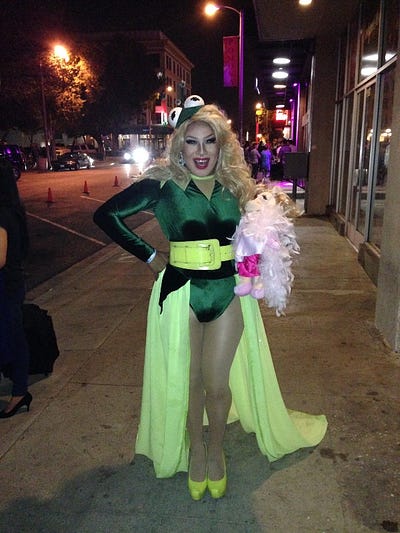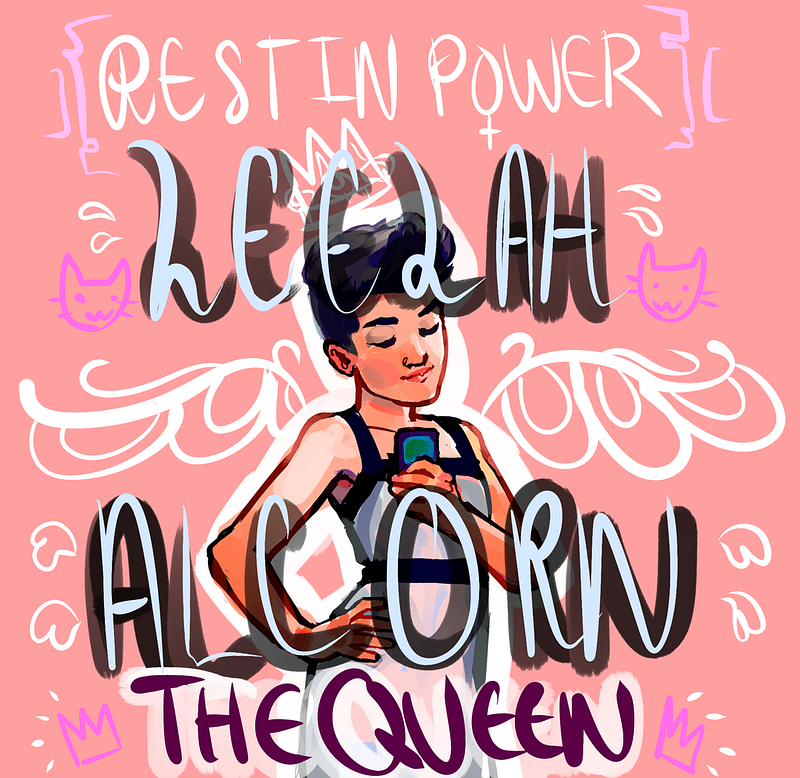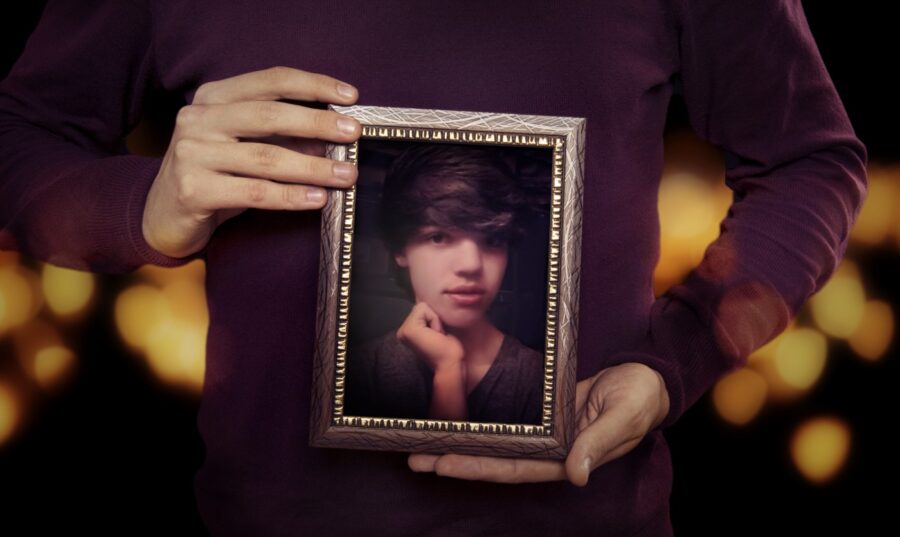Heart of a girl
The tragic loss of transgender teen Leelah Alcorn unites a community and fosters a new awareness of trans-identity.
Illustration by Jackie Rodriguez
The powerful pose of a young confident woman in a dress spread like wildfire across the internet; she held herself with grace and beauty looking into the mirror. The selfie that would be used to depict the 17-year-old Leelah Alcorn after her untimely suicide became a rallying cry for those who seek to end discrimination but there was still something horribly wrong. The shock and heartbreak rippled across social media after she posted her suicide note on Tumblr. People could not understand how it had happened until her family became vocal about the tragedy and it became clear that she was not accepted in her home life.
Alcorn, a transgender teen, had suffered at the hands of her parents who did not accept her gender identity and would not support her decision or allow her to begin transitioning. In her suicide note that has since been deleted by Tumblr, Alcorn wrote that her mother had reacted badly telling her that she would never be a girl and that God did not make mistakes when it came to things like gender. Leelah was later taken to Christian therapy where she was told that her gender identity was wrong. The incident has brought to light the effect conversion therapy has on LGBTQ youth in America. People across the nation claim that subjecting kids and teens to such programs should be considered child abuse. The debate is long and arduous, but the fact remains that people are dying. Trans people are dying.
In an interview with CNN, Alcorn’s parents said “We don’t support that, religiously, but we told him that we loved him unconditionally. We loved him no matter what,” Alcorn’s mother, Clara, said. “ I loved my son. People need to know that I loved him. He was a good kid, a good boy.”
Despite her pleas to the public and assertion that she loved her daughter, who she continuously misgendered as male throughout the interview, many activists have claimed that her parents in part drove her to suicide.
In the post she left as a suicide note Alcorn wrote, “Please don’t be sad, it’s for the better. The life I would’ve lived isn’t worth living in… because I’m transgender.” She briefly explained what that meant in the simplest terms before moving forward with her experience. “When I was 14, I learned what transgender meant and cried of happiness. After 10 years of confusion I finally understood who I was. I immediately told my mom, and she reacted extremely negatively, telling me that it was a phase, that I would never truly be a girl, that God doesn’t make mistakes, that I am wrong.”
She then took a moment to address parents who may be dealing with the recent coming out of a transgender child. “If you are reading this, parents, please don’t tell this to your kids. Even if you are Christian or are against transgender people, don’t ever say that to someone, especially your kid. That won’t do anything but make them hate themself. That’s exactly what it did to me.”
A major issue with trans people is the lack of understanding they receive from people whose gender identity matches their sex, called cisgender. What some people picture when they hear “transgender” is usually a man who parades around as a woman looking for sex, or someone who uses the opposite gender’s clothing for sexual gratification. This is, in fact, incorrect. Someone who is transgender is a person whose gender does not match their assigned sex. Gender, which is a mental construct, has no bearing on sex, which is physical.
For some people, the lack of connection between their sex and gender occurs when they are very young. Gaile Lauren LeClair, a trans man, is one example of someone discovering the disconnect between gender and sex. LeClair, 25, said he realized that his gender did not match his sex. “I knew since about 4 that I didn’t identify with gender assigned,” said LeClair. “It wasn’t until 17 that I even understood what being trans was. I was an unfortunate soul stuck in a body that wasn’t mine.”
The confusion and lack of understanding could, in some cases, lead to depression and self-harm, which was the case with LeClair. “I suffered with a lot of anger, depression. I resorted to self harm, drugs, suicide attempts,” said LeClair. “I was good at hiding it though. Most people don’t know what I’ve done or been through. We’re all good actors.”
It wasn’t until his 22nd birthday that he made the decision to begin his transition. The question has arisen about his sexual orientation as to whether or not he is interested in men or women. “I tend to stay away from labels when it comes to sexual preference. I love people and for all different reasons.”
As part of his transition, LeClair said he has not been stigmatized much by people, however there have been times when people did not understand the situation. “I’ve only encountered some negative feedback and in those situations, I’ve chosen to accept the way people might feel and not allow them to be in my life,” said LeClair. “Opinions are like buttholes, everybody’s got one. I’m fortunate to have a lot of love and support.”
Carmen DeSantiago-Lopez, 26, is another person who knew early on that their gender did not match their sex. DeSantiago-Lopez said she knew from the time she was a toddler that something was different.
“I always knew. I mean, when I was 3-years-old I was diagnosed with gender identity disorder, G.I.D. I didn’t have terminology for who I was until I started transitioning. Although I had been acting out my feminine desires through fashion and makeup since my junior year in high school.”
The transition process for DeSantiago-Lopez began prior to her coming out. She began hormone replacement therapy two months before she made the decision to come out to family friends. “They took it so well it just made me so happy that they just seemed to act like I was finally doing something normal,” she said.
DeSantiago-Lopez, who identifies as bi-gender, explained the difference between her gender identity and someone who is simply transgender. While someone who is transgender usually falls into the male/female portion of gender despite their sex, bi-gender is “someone who identifies and has two gender identities on the spectrum of gender. In this instance androgynous/female. It doesn’t always have to be complete opposite like male/female,” said DeSantiago-Lopez.
Although there is some concern about children realizing they are transgender, many opponents argue that a child is too young to understand the concept of gender identity. One prime example is that of Brad Pitt and Angelina Jolie’s child, who will be referred to as John and with gender neutral pronouns (the pronoun “ne” can be used in place of He/She to denote gender neutrality.) John Jolie-Pitt has taken the media by storm for the way ne dresses in clothing traditionally made for boys, and refers to nemself as John as opposed to nir birth name, Shiloh. Jolie said about John, “She likes to dress like a boy. She wants to be a boy. So we had to cut her hair. She likes to wear boys’ everything. She thinks she’s one of the brothers.” Pitt was also on board with John’s gender expression. “She only wants to be called John so we’ve got to call her John,” Pitt said. Neither Jolie nor Pitt have directly stated whether or not John is transgender, which is a decision John will or will not make in the future.
Another case of gender non-conforming children is the child of Gwen Stefani of No Doubt and Bush front man Gavin Rossdale’s son Kingston Rossdale who stirred up controversy when he was spotted in Malibu wearing makeup. Both Rossdale and Stefani did not seem to mind, even when Kingston wore a tutu during a birthday party, however others felt negatively about the whole situation. Mary Fischer, a blogger and writer for The Stir, said in 2013 on CafeMom.com, that she did not agree with allowing Kingston to wear makeup. “As the mother of a 7-year-old boy myself, I can’t imagine what in the heck would possess anyone to let their son wear makeup,” Fischer wrote. “Ok, scratch that. I can’t imagine letting any 7-year-old go out in public with makeup on, regardless of whether he or she is a boy or girl.”
Despite her assertion that it had nothing to do with Kingston’s sex, commenters rose to his defense. User JHSLOVE posted in the comments, “I’m sorry, but why is this any of your business? Good lord, I hardly ever see a Mary Fischer ‘article’ (and I use the term very loosely) that isn’t based on sticking your judgey nose in something that doesn’t concern you and isn’t any of your business. So she lets her son wear makeup. Who cares? It’s not like she’s coming over to your house and forcing you to put makeup on your son,” wrote JHSLOVE.
“There are plenty of parenting decisions that you make that I find questionable, but he’s not my kid…….so it’s not my problem and not my place to say anything. Do you really not have anything better or more meaningful to write about?”
Unfortunately, reactions such as Fischer’s are all too common as is the case with Leelah’s parents. LeClair said it’s sad that people don’t often see the beauty in different people, and that in the end it’s because of trans discrimination. “Its unfortunate we are sometimes too self obsessed to lend a helping hand or a even a hug to someone. Leelah, unfortunately, will not see the brighter tomorrow,” said LeClair. “Trans discrimination, hate crimes, abuse and many other things happen on a daily basis. We can’t continue to kill our own with the hateful words we impose on each other. I think people need to remember that even if we don’t understand each other doesn’t mean we aren’t entitled to the same respect.”
DeSantiago-Lopez felt similarly. “When you go through what we’re going through and society at large does everything in their power to marginalize trans women, and non-cisgender people’s bodies and deny their truths. It’s almost like the world doesn’t want you here sometimes,” said DeSantiago-Lopez. “If you’re not careful to surround yourself with support and love you can easily find yourself in a place of despair, or sadness that can lead to suicide like Leelah Alcorn. I’m not suicidal but I often wish I was born 200 years from now, and that no matter what, the world isn’t truly ready for it’s non binary counterparts.”
But what happens when basic disagreement becomes more forceful? The market for reparative therapy, also known as conversion therapy, aims to change a person’s sexual orientation and gender identity to correlate with what is viewed as normal. Prior to her suicide, Leelah Alcorn’s parents enrolled her in this type of therapy in an attempt to “cure” her and make her identify as a boy. Sadly, Alcorn’s therapy is not unheard of in the United States. Josue Velasquez, 26, experienced conversion therapy when he was in high school because he is gay. Velasquez said that his mother went so far as borrowing money and having the family go without so that she could send him to a conversion camp. Through a Pentecostal church in Southern California, the Assemblies of God, Velasquez was taken away. “After surrendering my cell phone and all forms of communication I found myself at a ranch in the mountains.” At the ranch, the men were assigned to their rooms where they would be woken up at 6 a.m. for breakfast, followed by prayer from 8 a.m. to noon.
On one occasion Velasquez said he was doing worship, and raised his hands in prayer in attempts to feel the holy spirit. It was then that he said he felt the group leaders surround him and put holy oil on his head. That is when things went from bad to worse for Velasquez. “Their voices began to grow in prayer and chants. They demanded that God free me from the homosexual demon that had enslaved my soul and life. I had been crying and shaking by now,” said Velasquez. “I fell to the ground a few seconds later, only to remember that I had been convulsing on the floor. My body spread open, the church leaders pinned both arms and legs down, and continued to demand that the demon give them their name. As I lay there I began to speak in tongues, and after a while of them asking ‘tell us your name demon,’ something came out of me.”
“I don’t recall what had come out of my mouth because I didn’t understand what was going on and because my body had been paralyzed for a while. After intensive prayer and what I can call a spiritual fight with the demon, I began to vomit. The church believed the vomit was the expulsion and liberation of demons, fully having reached liberation through deliverance.”

Despite the proclamation by the church that he was “cured,” Velasquez said he knew he was still gay. He would go on as a member of the church, even undergoing two more supposed exorcisms until the church fell apart. It wasn’t until much later that he was able to accept himself as an out and proud gay man, taking on the identity of La Bugonvillia, a drag performer. “It wasn’t until a few years later, in 2010 that I fell in love with the show Rupaul’s Drag Race, and in 2010 slipped into my first wig, dress and heels,” said Velasquez. “For now, drag is an art of expression for me. It is a way that I can still live my dream of fashion and costume making. I make all of my costumes and the costumes for other drag queens.”
Some, however, are not so fortunate to come out of conversion therapy unscathed. Leelah Alcorn is one of the many people whose spirit was broken by conversion therapy.
“It’s disgusting. How is someone supposed to tell me how to feel or how I’m supposed to behave? I’m more level headed and confident then ever,” said LeClair regarding the practice of conversion therapy. “I pay taxes and abide by all your laws. What makes me wrong for pursuing happiness as me?” He added about Alcorn’s parent, “Maybe it’s the parents who need reparative therapy. I see more acceptance from small children. Maybe we could learn from the love in their eyes.”
Although there is no definitive scientific evidence that conversion therapy works, proponents still claim that through God and psychotherapy a person’s gender identity and sexuality can be changed. DeSantiago-Lopez disagrees. “Well, I would simply say this. If they believe it is so effective, I’d like to see sessions where they try and change someone who is cisgender and heterosexual into someone who is transgendered and queer,” she said. “Then I’d believe in it more than I believe in Santa Claus right now.”
Because of the controversy sparked by Alcorn’s suicide, a petition was started to ban conversion therapy. The law, which would be titled “Leelah’s Law” would ban conversion therapy on children and teens. At the time of this article’s publication the petition needs 85,302 signatures by Jan. 30 to meet its goal.

The tragic loss of life still echos across the nation as people struggle to help those facing situations similar to Alcorn’s. From creative fan art in her memory, to songs and poems dedicated to trans people who are facing acts of intolerance and cruelty, the LGBTQ community is uniting. During the 2015 Golden Globe awards, Jill Soloway, creator of the Amazon original series Transparent, dedicated the win for best TV comedy to Leelah Alcorn. “This award is dedicated to the memory of Leelah Alcorn and too many trans people who die too young,” Soloway said during her speech. She also dedicated the award to her own trans parent who she referred to affectionately as her moppa. “I just want to thank you for coming out because in doing so you made a break for freedom, you told your truth, you taught me how to tell my truth and make this show. And maybe we’re going to be able to teach the world something about authenticity and truth and love. To love.”
LeClair gave some words of advice to those who may be struggling with the coming out process or those facing a difficult transition. “I can’t give you God or a savior. I can only tell you that I’m here for you, as a community we are here for you; for each other.” He added that although he is unsure of heaven or hell, life is what you make of it. “I choose to be happy every day and you could choose it too, but above all I’m here for you. Just reach out.”
DeSantigo-Lopez had similar advice for those who are struggling. She said that first and foremost to look deep inside and ignore everything else. “You already know what makes you happy and you have to do that. No matter what you think you’ll lose, no matter how many people you think you’ll disappoint, you have to do what’s right for you.” She added that in time you will come to see that the only truth that matters is your own truth because in the end, it is your life. “Tomorrow you have to live with the decisions you make today. The reality is that yes, more than likely it is a tough road to travel. However all good things in life are hard work. It’s like going to college. The struggle is real but the rewards you reap are worth the struggle and they will enrich your life and complete you as a person.”

Substance is a publication of the Mt. San Antonio College Journalism Program. The program recently moved its newsroom over to Medium as part of a one-year experiment. Read about it here.











